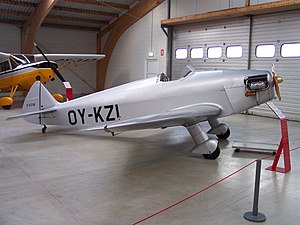SAI KZ I
| KZ I | |
|---|---|

| |
| KZ I replica in Danmarks Flymuseum | |
| Role | Sport aircraft |
| National origin | Denmark |
| Manufacturer | Skandinavisk Aero Industri |
| Designer | Viggo Kramme and Karl Gustav Zeuthen |
| First flight | 24 February 1937 |
| Number built | 1 |
The SAI KZ I was a sport aircraft built in Denmark in 1937, the first aircraft built by the Kramme & Zeuthen firm.
Design and development
The KZ I was a low-wing cantilever monoplane of conventional design, with fixed tailwheel undercarriage and an open cockpit with a single seat. Construction throughout was of wood.
Only a single KZ I was constructed, and it disappeared during the course of World War II. During the 1970s, a flying replica was built, with work started by Gunnar Fjord Christensen in 1972 and sold to the Danmarks Flymuseum in 1977. The completed aircraft, powered by a more powerful but heavier 50 hp (37 kW), 1.5 L (92 cu in) Volkswagen flat-four engine, flew for the first time on 20 November 1988 and in 2008 remains part of the museum's collection.
Specifications
Data from Danmarks Flymuseum : KZ I.[1]
General characteristics
- Crew: 1
- Wingspan: 7.2 m (23 ft 7 in)
- Wing area: 8.4 m2 (90 sq ft)
- Airfoil: root: NACA 23018; tip: NACA 23009[2]
- Empty weight: 192 kg (423 lb)
- Gross weight: 325 kg (717 lb)
- Powerplant: 1 × ABC Scorpion two cylinder air-cooled horizontally-opposed piston engine, 28 kW (38 hp)
- Propellers: 2-bladed fixed-pitch propeller
Performance
- Maximum speed: 180 km/h (110 mph, 97 kn)
- Landing speed: 60 km/h (37 mph; 32 kn)
- Cruise speed: 160 km/h (99 mph, 86 kn)
- Service ceiling: 5,000 m (16,000 ft)
References
- ^ "KZ I". flymuseum.dk (in Danish). Copenhagen. Retrieved 19 April 2019.
- ^ Lednicer, David. "The Incomplete Guide to Airfoil Usage". m-selig.ae.illinois.edu. Retrieved 16 April 2019.
Further reading
- Taylor, Michael J. H. (1989). Jane's Encyclopedia of Aviation. London: Studio Editions. p. 563.
- Simpson, R. W. (1995). Airlife's General Aviation. Shrewsbury: Airlife Publishing. pp. 348–49.
